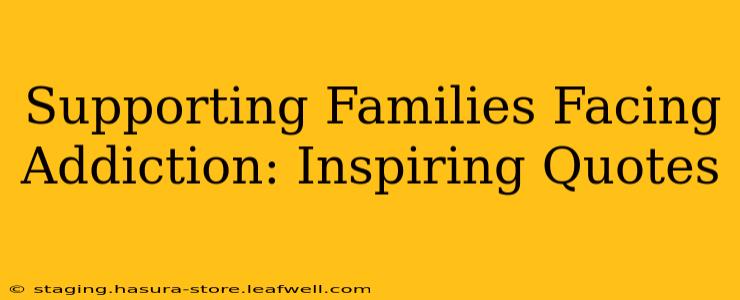Addiction impacts not just the individual struggling, but their entire family network. The emotional toll is immense, leaving loved ones feeling lost, confused, and overwhelmed. Finding strength and hope amidst this turmoil is crucial. This article offers inspiring quotes to provide comfort and encouragement, along with resources to help families navigate this challenging journey. We'll explore common questions families face and provide practical guidance for support and recovery.
What are some inspiring quotes for families facing addiction?
Finding the right words during difficult times can be challenging. These quotes offer solace and strength for families facing the impact of addiction:
-
"The best and most beautiful things in the world cannot be seen or even touched - they must be felt with the heart." - Helen Keller: This quote reminds us that love and support, though intangible, are powerful forces in recovery. Families' unwavering love and support are vital to the healing process.
-
"Hope is the thing with feathers that perches in the soul and sings the tune without the words and never stops at all." - Emily Dickinson: Hope is a lifeline during times of despair. Even in the darkest moments, holding onto hope for recovery is essential.
-
"What lies behind us and what lies in front of us, pales in comparison to what lies within us." - Ralph Waldo Emerson: This emphasizes the inner strength and resilience that families often find unexpectedly during challenging times.
-
"The oak sleeps in the acorn; the bird waits in the egg; and in the highest vision of the soul a waking angel stirs. Dreams are the seedlings of realities." - James Allen: This quote speaks to the potential for growth and healing. Recovery is a process, and even small steps forward represent significant progress.
-
"Courage doesn't always roar. Sometimes courage is the quiet voice at the end of the day saying, 'I will try again tomorrow.'" - Mary Anne Radmacher: This quote acknowledges the daily struggles families face and encourages perseverance. Recovery is not a linear process; setbacks are normal, and trying again is a sign of strength.
What support is available for families affected by addiction?
Families don't have to navigate this alone. Many resources offer support, guidance, and practical assistance:
-
Al-Anon/Alateen: These support groups offer a safe space for family members to share their experiences, learn coping mechanisms, and connect with others facing similar challenges. Al-Anon focuses on adult family members, while Alateen is specifically for teenagers.
-
Nar-Anon: This group focuses on the impact of narcotics addiction on families.
-
National Institute on Drug Abuse (NIDA): NIDA provides extensive information on addiction, treatment options, and support resources.
-
SAMHSA National Helpline: This confidential, free, 24-hour-a-day, 365-day-a-year, information service, in English and Spanish, provides referrals to local treatment facilities, support groups, and community-based organizations.
How can I help a family member struggling with addiction?
Supporting a loved one struggling with addiction requires patience, understanding, and education. Here are some key strategies:
-
Educate yourself about addiction: Understanding the nature of addiction is crucial for effective support. Learn about the different types of addiction, the impact on the brain, and available treatment options.
-
Encourage professional help: Addiction is a complex disease requiring professional treatment. Encourage your loved one to seek help from a doctor, therapist, or addiction specialist.
-
Set healthy boundaries: It's essential to establish clear boundaries to protect your own well-being. This may involve limiting contact, refusing to enable destructive behaviors, and prioritizing your own mental and emotional health.
-
Practice self-care: Supporting a loved one with addiction can be emotionally draining. Prioritize self-care activities to maintain your well-being and prevent burnout.
What are the signs of addiction in a family member?
Recognizing the signs of addiction is the first step towards seeking help. Some common signs include:
- Changes in behavior or personality: Increased secrecy, irritability, mood swings, or withdrawal from social activities.
- Financial problems: Unexplained debt, missing money, or financial instability.
- Neglect of responsibilities: Missing work or school, neglecting personal hygiene, or neglecting family obligations.
- Legal problems: Arrests or convictions related to substance use.
- Physical changes: Changes in appearance, weight loss or gain, or health problems.
How can I cope with the emotional stress of supporting a family member with addiction?
Coping with the emotional stress of supporting a loved one with addiction requires self-compassion and seeking support. Here are some helpful strategies:
-
Join a support group: Connecting with others facing similar challenges provides a sense of community and shared understanding.
-
Seek professional help: Therapy can help you process your emotions, develop coping mechanisms, and build resilience.
-
Practice self-care: Prioritize activities that promote your physical and emotional well-being, such as exercise, healthy eating, meditation, and spending time in nature.
-
Set realistic expectations: Recovery is a journey, not a destination. Celebrate small victories and be patient with the process.
Remember, you are not alone. Seeking support and information is a sign of strength, and recovery is possible. The quotes above offer a glimpse of hope, but the resources mentioned provide the practical tools you need to navigate this difficult journey.

